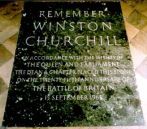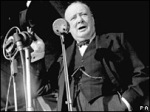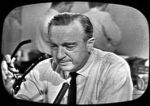“I have nothing to offer but blood, toil, tears and sweat.”
Winston Churchill“You ask, what is our aim? I can answer in one word: victory.”
Winston Churchill“And that’s the way it is.”
Walter Cronkite
—————-
 Many famous people are buried beneath Westminster Abbey. But, at Westminster Abbey, there is one plaque, prominenty on display, honoring someone who is not buried there: Winston Churchill. (Read about it here). Here’s what is on that plaque:
Many famous people are buried beneath Westminster Abbey. But, at Westminster Abbey, there is one plaque, prominenty on display, honoring someone who is not buried there: Winston Churchill. (Read about it here). Here’s what is on that plaque:
REMEMBER
WINSTON CHURCHILL
IN ACCORDANCE WITH THE WISHES OF
THE QUEEN AND PARLIAMENT T
HE DEAN & CHAPTER PLACED THIS STONE
ON THE TWENTY FIFTH ANNIVERSARY OF
THE BATTLE OF BRITAIN
15 SEPTEMBER 1965
He deserves such recognition. I’m not sure the country would have survived without him. Especially without his words.

Last Saturday, NPR’s Morning Edition Saturday aired a segment on Winston Churchill: Winston Churchill’s Way With Words by Tom Vitale.
It was a wonderful segment, with a reminder that Churchill may have saved England with the sheer brilliance (actually, “simple” brilliance) and power of his words, his speeches.
Here are some excerpts of the segment:
Winston Churchill wrote every word of his many speeches — he said he’d spend an hour working on a single minute of a speech.
Winston Churchill is best remembered as the British prime minister whose speeches rallied a nation under a relentless Nazi onslaught in World War II. But few people know that he won the Nobel Prize in Literature — in part for his mastery of speechmaking.
Now, a new exhibition at the Morgan Library in New York City, Churchill: The Power of Words, holds a megaphone to Churchill’s extraordinary oratory.and…
In another landmark speech, Churchill proclaimed: “You ask, what is our aim? I can answer in one word: victory. Victory at all costs. Victory in spite of all terror. Victory, however long and hard the road may be, for without victory there is no survival.”and…
Churchill wasn’t born a master orator — he overcame a childhood lisp by practicing enunciation.On June 18, 1940, immediately after the fall of France, Churchill rallied the British people once more. With his characteristic Shakespearean gusto, he declared, “Let us therefore brace ourselves to our duty, and so bear ourselves, that if the British Empire and its Commonwealth last for a thousand years, men will still say, ‘This was their finest hour.’ “
On April 9, 1963, President John F. Kennedy summed up Churchill’s speechwriting achievements, saying, “In the dark days and darker nights when England stood alone — and most men save Englishmen despaired of England’s life — he mobilized the English language and sent it into battle.”
He spent an hour on a minute of speech. He used exactly the right word(s), the best word – the “simple” word. “In a word, victory.” It can’t be any clearer than that.
And he “practiced” enunciation to overcome a childhood lisp. He worked hard to be easily understandable.

That point reminds me of a specific detail about Walter Cronkite’s brilliance. He wanted to be easily understood, and so he developed the skill of speaking slowly enough to be easily understood. This is from the Wikipedia page about Cronkite (but I’ve read it elsewhere also):
Walter Cronkite trained himself to speak at a rate of 124 words per minute in his newscasts, so that viewers could clearly understand him. In contrast, Americans average about 165 words per minute, and fast, difficult-to-understand talkers speak close to 200 words per minute.
So, here are your three presentation skills tips for the day:
#1 – Learn to say what you have to say with the fewest number of clear and easy-to-grasp words. Work! on the right word choice. (Churchill took an hour to write one minute’s worth of text).
#2 – Practice your enunciation. The only test is this: are you easily understood?
#3 – Slow down in your speaking. Say your words slowly enough to be easily understood. Again, the only test is this: are you easily understood?
And, a reminder that goes without saying – getting good at genuinely effective communication is not all that easy. It takes time, and work, and long-term focus, and…
